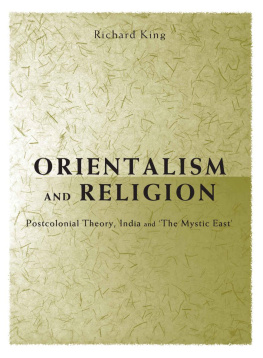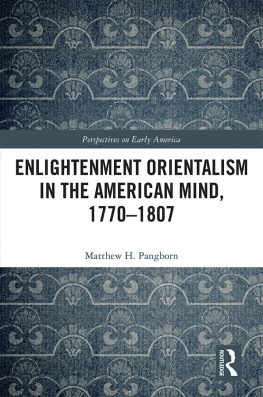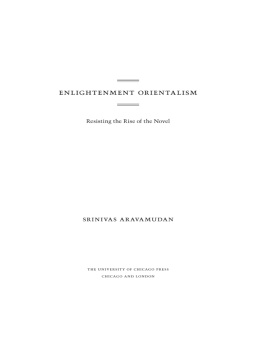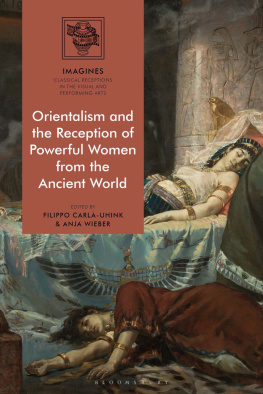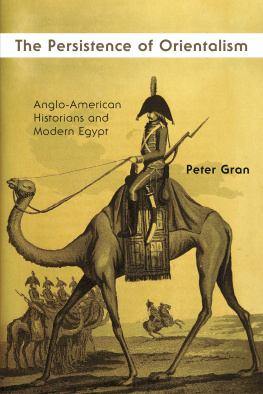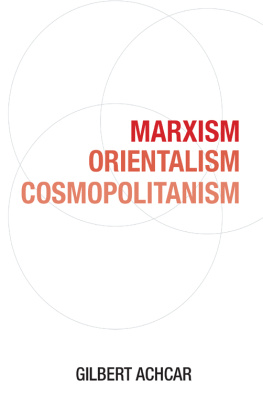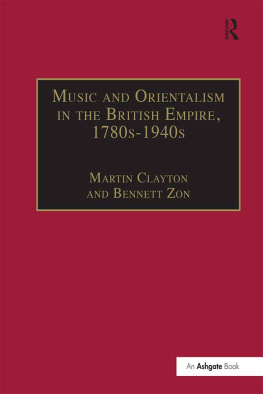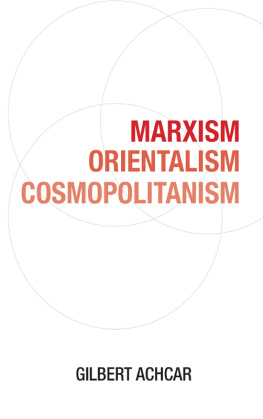Urs App - The Birth of Orientalism
Here you can read online Urs App - The Birth of Orientalism full text of the book (entire story) in english for free. Download pdf and epub, get meaning, cover and reviews about this ebook. year: 2010, publisher: University of Pennsylvania Press, Inc., genre: Religion. Description of the work, (preface) as well as reviews are available. Best literature library LitArk.com created for fans of good reading and offers a wide selection of genres:
Romance novel
Science fiction
Adventure
Detective
Science
History
Home and family
Prose
Art
Politics
Computer
Non-fiction
Religion
Business
Children
Humor
Choose a favorite category and find really read worthwhile books. Enjoy immersion in the world of imagination, feel the emotions of the characters or learn something new for yourself, make an fascinating discovery.

The Birth of Orientalism: summary, description and annotation
We offer to read an annotation, description, summary or preface (depends on what the author of the book "The Birth of Orientalism" wrote himself). If you haven't found the necessary information about the book — write in the comments, we will try to find it.
Urs App: author's other books
Who wrote The Birth of Orientalism? Find out the surname, the name of the author of the book and a list of all author's works by series.
The Birth of Orientalism — read online for free the complete book (whole text) full work
Below is the text of the book, divided by pages. System saving the place of the last page read, allows you to conveniently read the book "The Birth of Orientalism" online for free, without having to search again every time where you left off. Put a bookmark, and you can go to the page where you finished reading at any time.
Font size:
Interval:
Bookmark:
The Birth of Orientalism
ENCOUNTERS WITH ASIA
Victor H. Mair, Series Editor
Encounters with Asia is an interdisciplinary series dedicated to the exploration of all the major regions and cultures of this vast continent. Its timeframe extends from the prehistoric to the contemporary; its geographic scope ranges from the Urals and the Caucasus to the Pacific. A particular focus of the series is the Silk Road in all its ramifications: religion, art, music, medicine, science, trade, and so forth. Among the disciplines represented in this series are history, archeology, anthropology, ethnography, and linguistics. The series aims particularly to clarify the complex interrelationships among various peoples within Asia, and also with societies beyond Asia.
A complete list of books in the series is available from the publisher.

Copyright 2010 University of Pennsylvania Press
All rights reserved. Except for brief quotations used for purposes of review or scholarly citation, none of this book may be reproduced in any form by any means without written permission from the publisher.
Published by
University of Pennsylvania Press
Philadelphia, Pennsylvania 19104-4112
Printed in the United States of America on acid-free paper
10 9 8 7 6 5 4 3 2 1
Library of Congress Cataloging-in-Publication Data
App, Urs, 1949
The birth of orientalism / Urs App.
p. cm. (Encounters with Asia)
Includes bibliographical references and index.
ISBN 978-0-8122-4261-4 (acid-free paper)
1. AsiaReligionStudy and teachingHistory18th century. 2. OrientalismEuropeHistory18th century. 3. EuropeIntellectual life18th century. 4. ReligionsStudy and teachingHistory18th century. I. Title.
BL1033.A66 2010
294dc22
2010004556
To my sensei
YANAGIDA Seizan
(19222005)
Fact Is FictionAnd Fiction Is Fact
Orientalism has been a buzzword since Edward Saids eponymous book of 1978. Critics have pointed out that Saids Orient is focused on the Arab world and excludes most of what Westerners mean by the word. A more recent history of Orientalism, Robert Irwins For Lust of Knowing, criticizes Saids narrow view of orientalists as those who travelled, studied or wrote about the Arab world (2006:294) but goes on to use the same somewhat arbitrary delimitation of the subject matter (p. 6), which leaves out India, China, Japan, Tibet, Central Asia, North Asia, and Southeast Asiain other words, most of what we mean by Asia and more than half of humankind.
The term Orientalism also has many other connotations, for example, in the context of oriental fashions of the seventeenth and eighteenth centuries or the imitation of oriental styles in garden architecture and painting. The Orientalism whose birth process is examined in this book is modern Orientalism, that is, the secular, institutionalized study of the Orient by specialists capable of understanding oriental languages and handling primary-source material. Its genesisand, more generally, the history of premodern Europes encounter with Asiais still barely known. The present book does not claim to furnish a history of Orientalism as a whole. Its much more modest aim is to elucidate through relatively extensive case studies a crucial phase of the European encounter with Asia: the century of Enlightenment. The focus is on the European discovery of the regions east of Saids and Irwins Orient, in particular on Europes discovery of non-Islamic Asian religions. The facets of Asian religions treated are, needless to say, determined by the interests of the protagonists of the included case studies. Unlike Immanuel Kant (App 2008a), they showed little interest in Tibetan religion; hence there is little discussion of it in this book.
Why the focus on religion? Because the role of colonialism (and generally of economic and political interests) in the birth of Orientalism dwindles to insignificance compared to the role of religion. Modern Orientalism is the successor of earlier forms of Orientalism involving the study of Asian languages and texts. Christian Europe had been wrestling with Islam for many centuries; from the sixteenth century many of its universities prided themselves on having an orientalist professor who specialized in Hebrew and other Bible-related languages such as Aramaic, Syriac, and sometimes even Arabic or Persian. Such premodern academic Orientalism was generally a handmaiden of Bible studies and theologywhich explains its almost exclusive focus on regions, languages, and religions that play a role in the Old and New Testaments. Studies of Oriental texts and languages beyond the biblical region usuallythough not exclusivelyoccurred in the context of Christian missions.
The eighteenth century brought a momentous change that opened the door to a new kind of Orientalism, less shackled by theology, Bible studies, the frontiers of the Middle East, and Europes time-honored Judeo-Christian worldview. This new or modern Orientalism was prepared by a growing interest in India as the cradle of civilization, an interest that was promoted by Voltaire (16941778) in his quest to denigrate the Bible and destabilize Christianity (see between theology, religious studies, and Asian studies in todays academic environment would indicate that this emancipation process is far from finished.
It is easily forgotten that even in the 1820s Europeans believed with few exceptions that the world is only a few thousand years old, that all the worlds peoples can be traced back to Noahs Ark, and that Christianity is the fulfillment and goal of all religion. Even well-informed people like the philosopher Georg Wilhelm Friedrich Hegel (17701831) had no doubt about this, as his lectures on the philosophy of history and on oriental religions show (App 2008a). Fundamental views about where we come from, where we stand, and where we are headed played an extraordinary role in the discovery of other cultures and religions. The notion of a soul that, once created, goes on living forever, or of a future state in which acts committed during life will be rewarded or punished, were incomparably more important in the European discovery of Asian religions than were commercial greed and imperialist ambitions. The same is true for the conviction that there is a God who created the universe out of nothing, manages its smooth functioning, foresees everything, punishes mans evil deeds by natural disasters such as floods, and sent his son to atone for mans sins. Such notions form the ideological background of the European discovery of Asian religions, and the history of Orientalism is to a substantial degree also a history of the Wests gradual detachment from this traditional ideology.
It is a central thesis of this book that Europes discovery of Asian religions was deeply linked to the development of Orientalism and its gradual emancipation from biblical studies. The birth of modern Orientalism was not a Caesarean section performed by colonialist doctors at the beginning of the nineteenth century when Europes imperialist powers began to dominate large swaths of Asia. Rather, it was the result of a long process that around the turn of the eighteenth century produced a paradigm change. Our case studies show a centuries-long, gradual broadening of perspectives beyond the sphere circumscribed by Abrahamic religions and the Bible. As in all discoveries, the familiar determined to a large extent the appearance of the new. But Europes Bible-based worldview with its creation, paradise, fall, deluge, monotheist orthodoxy, and satanic idolatrythe mirror in which Asian religions appearedwas also gradually changing. Hence, our case studies reflect not only evolving images of Asias religious landscape but also a transformation of the worldview of the perceivers. In the course of the eighteenth century, Europes dominant ideological matrix experienced a deepening crisis, and its hitherto unassailable biblical foundations showed ever more threatening fissures. The loss of biblical authority, which was due to many factors, occurred at a time when Judaism and Christianity themselves began to be increasingly viewed as local phenomena on a dramatically expanded, worldwide canvas of religions and mythologies. At the end of the eighteenth century, Volneythe subject of our last case studyportrayed Christianity as a relatively insignificant and young local religion based on local varieties of solar myth, and Langls officially promoted a new Orientalism liberated from the shackles of theology and biblical studies.
Next pageFont size:
Interval:
Bookmark:
Similar books «The Birth of Orientalism»
Look at similar books to The Birth of Orientalism. We have selected literature similar in name and meaning in the hope of providing readers with more options to find new, interesting, not yet read works.
Discussion, reviews of the book The Birth of Orientalism and just readers' own opinions. Leave your comments, write what you think about the work, its meaning or the main characters. Specify what exactly you liked and what you didn't like, and why you think so.

